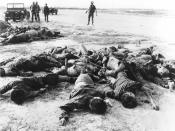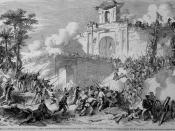Lan Cao's, Monkey Bridge traverses perilously between worlds past and present, East and West. It is told through two interlocked stories of a Vietnamese mother and daughter who immigrated to America to seek refuge from their ever-changing and increasingly dangerous native land. Through their combined life experiences and quandaries one can much better understand the tragedy of the Vietnam War and relate to the Vietnamese on a more personable level.
The story disclosed by the daughter was a classic immigrant experience of a young child being aborted to America, leaving behind all she had ever known, including her family, friends, and a secure home. Fleeing her overwhelmingly distressed nation caused her to lose almost everything, but left her with the haunting memories of war and separation. These unpleasant memories imparted several lasting reservations that she has tried relentlessly to overcome.
Mai Nguyen was a young girl of only seven or eight years when she arrived in the "ÃÂland of the free,' but had already been exposed to much more than the average girl of her age.
"A scattering of gun shots tore through the plaster walls. Everything was unfurling, everything, and I knew I was back there again, as if the tears were always pooled in readiness beneath my eyes. It was all coming back, a fury of whiteness rushing against my head with a violent percussive rage. (1) "I knew I was not in Saigon. I was not a hospital volunteer."� (2) Unfortunately, experience meant little for a young girl in a foreign land.
Mai's mother story was of betrayal, political intrigue, family secrets, and revenge. Compiled among these were the reasons she had for leaving Vietnam; never did she intend on it becoming a permanent change. For fear of corrupting Mai, her mother chose to hide significant details dealing with the family's past for many years. "Though I have often thought of revealing that hidden world for you, I also wanted to protect you from the phantoms and apparitions that come with it."� (228) This secrecy compelled Mia to formulate her own conclusions about her family and assisted in developing an undesired distance between her and her mother. "In the end, my conflicting desires have left you with an invisible silence that slides like a softer whisper beneath the double shadows of our lives."� (228) The reader sees the relationship between mother and daughter unravel throughout the majority of the book. Unforgiving secrets, age, and firm individual beliefs prove to be no match for paternal love when all internal conflict is eventually resolved and left in the past. This concept not only provides hope for those who are able relate directly with the Vietnamese, but the universal theme of "ÃÂunderstanding,' which deals directly with the mother-daughter relationship, is eternally ongoing.
By realizing the forces that drove these women to make their decisions it allows for a deeper understanding of the lesser-known tragedies of equal importance, in relation to the aftermath. Wars, most often viewed as having a winner and a loser, are now decidedly not so simple. For both sides suffering is the inevitability of war and war is the assurance of failure and triumph; thus, leaving only one thing for a single side to possess, fleeting power.



